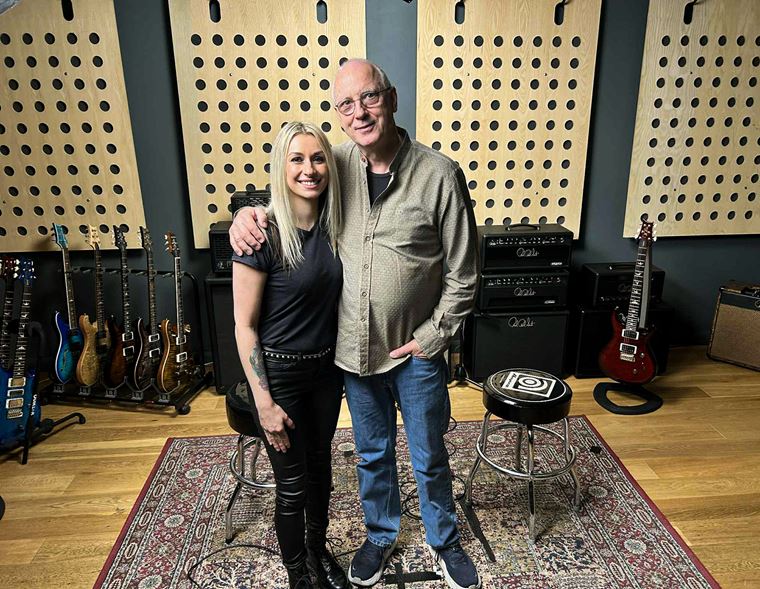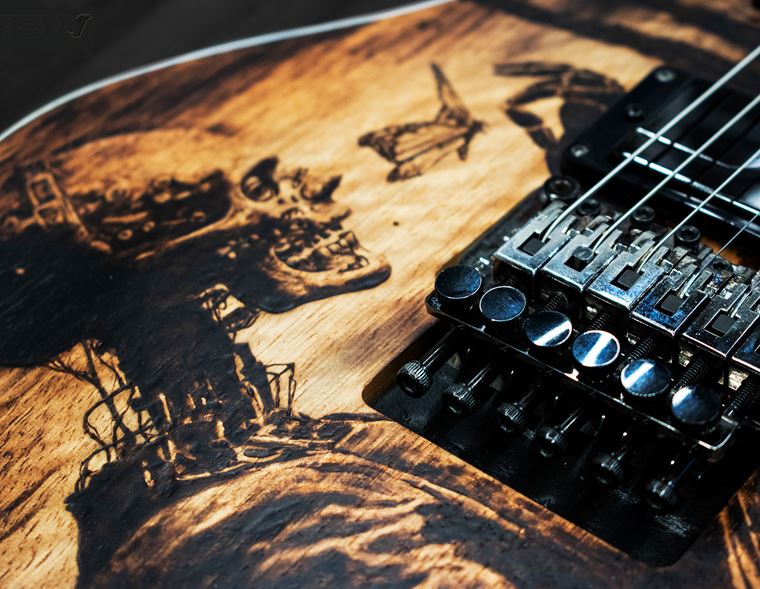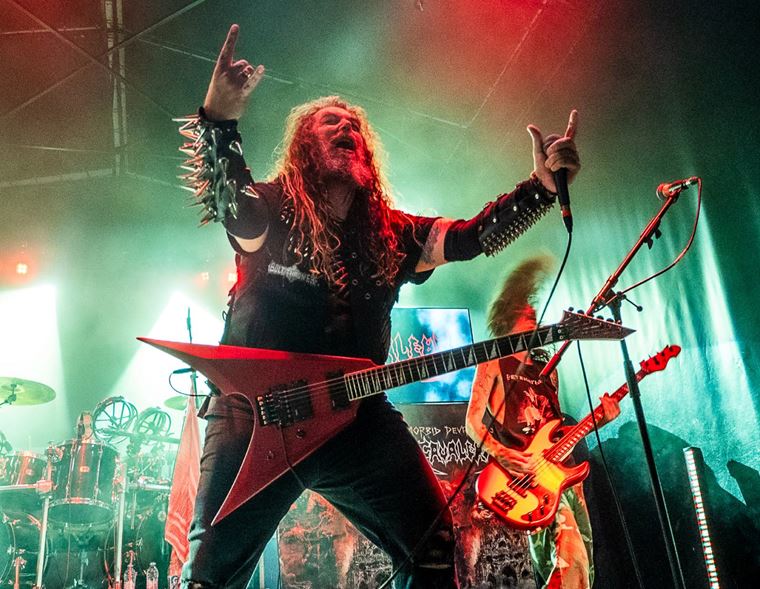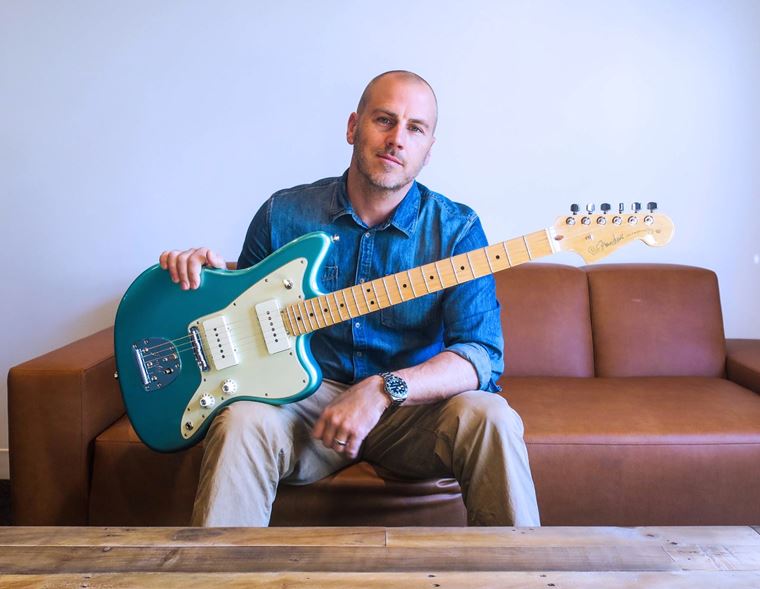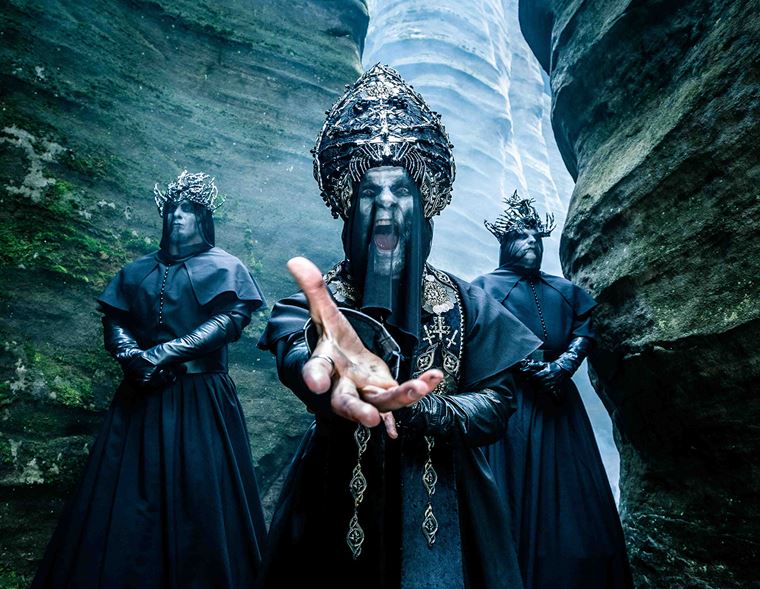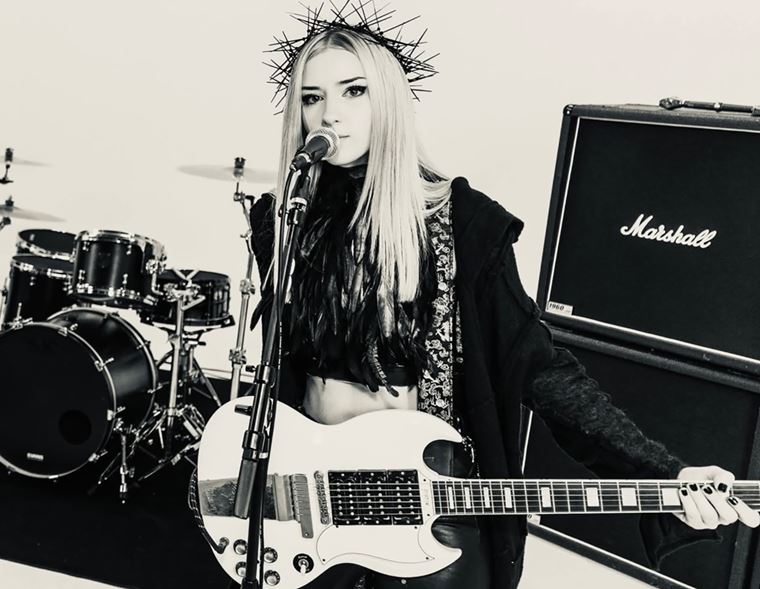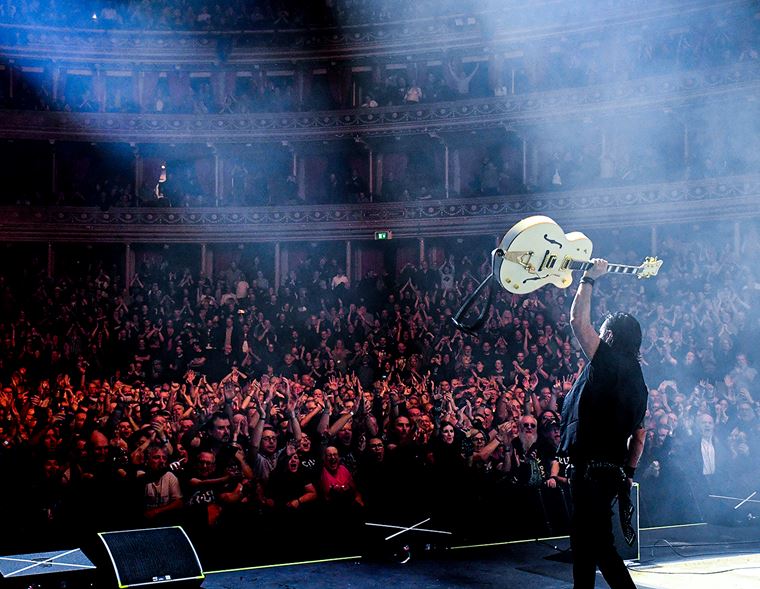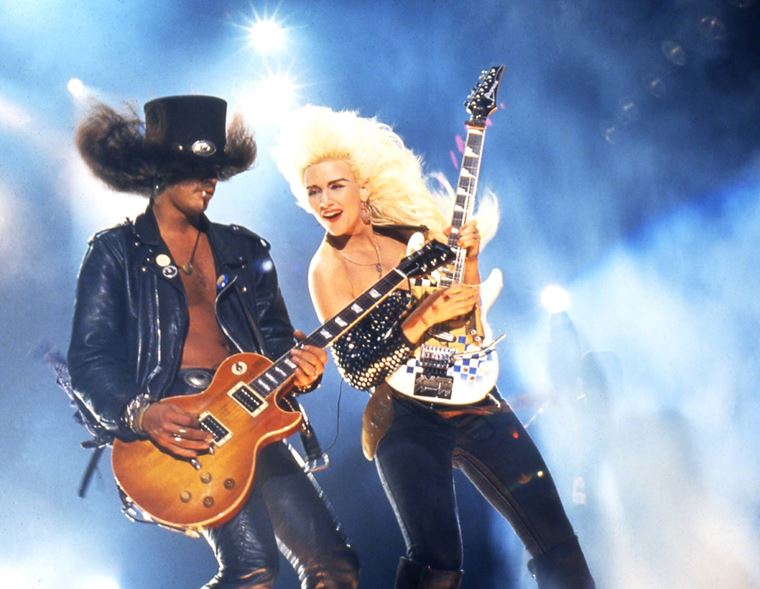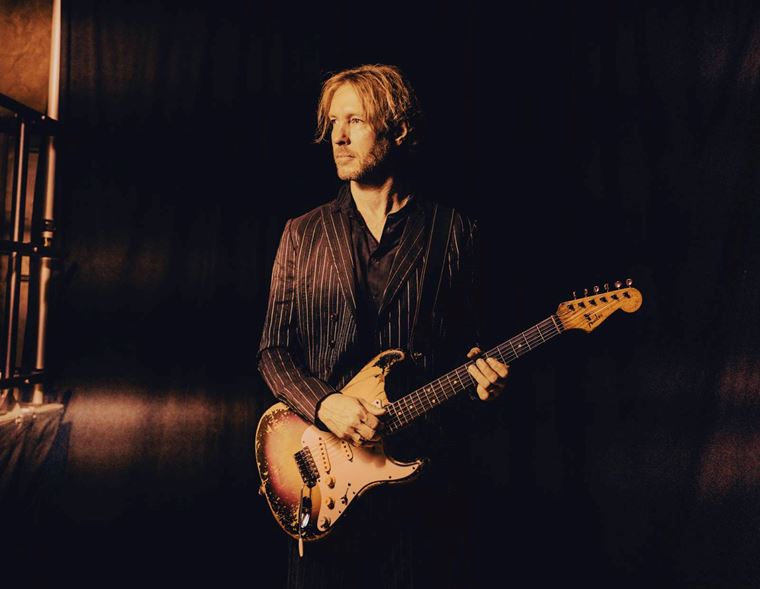CRADLE OF FILTH's Daniel Firth Talks BASS!
How do you like your metal?
Extreme, grandiose, terrifying and tinged with melancholy? If so, you must be a Cradle of Filth fan. For 30 years, these Dark Lords from Suffolk have brought a particularly theatrical brand of operatic metal to the masses. They have endured infamy, courted controversy and kept a loyal fanbase for decades, all based on good old fashioned entertainment.
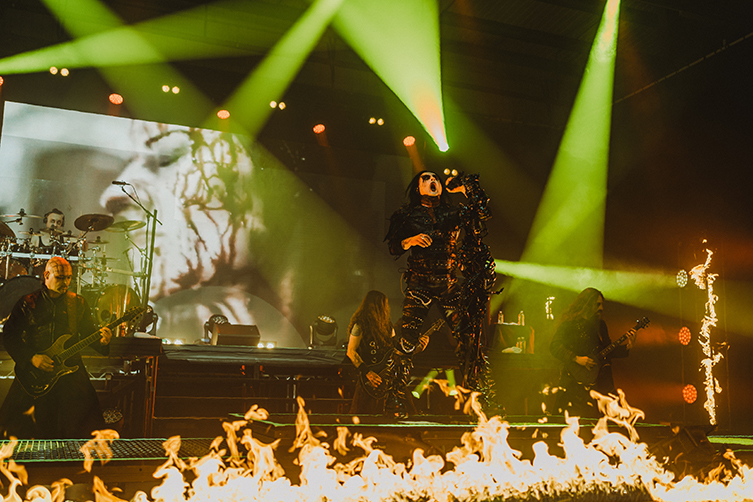
(Photo: Tom Russell)
That, and shock value. At least in the early days. Whilst the censor-baiting T-shirts of the band’s early days may be a thing of the past, Cradle of Filth’s sound and image are as uncompromising as ever. In a career that has spawned 12 studio albums, a horror movie and countless live performances, Cradle have brought a highly romanticised and gothic sensibility to their blend of dramatic blackened metal. Their fans are notoriously loyal and intense, making the music of Cradle of Filth more of a lifestyle than a listening option.
One man who takes all of this in his stride is bassist Daniel Firth. Playing with the band since 2012, the Orkney Isles-born Firth has supplied low-end attitude and menace both on stage and in the studio. One would be forgiven for expecting Firth to be a terrifying wraith in person, a bearded figure of supernatural danger. In fact, via Zoom, he’s a very relaxed, affable chap who is happy to talk about HP Lovecraft and Edgar Allan Poe but is as far from the cliched ‘Metal musician’ as one can reasonably get whilst still being able to don the makeup effectively when it’s time to call upon the beast that is Cradle of Filth.
We chatted recently about his new signature Schecter bass, his formative influences and about what Cradle have been doing with themselves since lockdown...
Guitarguitar: So, Cradle of Filth have been going since the early 90s and you joined, I think, in 2011 or 2012, so how did a boy from Orkney get involved with them in the first place?
Daniel Firth: Well it was actually through a Scottish band called Man Must Die. I went down to Ipswich to do some recording with them for a single we were doing. We were recording with Scott Atkins, who at the time was producing Cradle of Filth. I guess they had parted ways with their bassist, and were looking for someone else to step in for the sessions. Scott thought I would be the man for the job and put my name forward! So that was it, really: a few emails, few phone calls and that was me recording the album. That would have been round about May 2012, I think.
Then they had a gig in the diary – the Wacken festival in August – so I just got in touch with the band's manager and said, ‘I don’t suppose you’re looking for somebody who can do this show?’ and she said, ‘Yeah, I think you’re the man for the job’, so, it worked out pretty well!
GG: Fantastic! Wow, that’s a very nice, smooth way to do things, haha! With Cradle of Filth, there’s a huge influence of classic horror movies and kind of romantic, gothic literature. There’s that whole aesthetic involved with the band. Are those the kinds of things that you were already into anyway?
DF: Yeah, I’d say so. I’m a big fan of horror films, and in terms of literature, I’m into Lovecraft and Poe, similar to the stuff that Dani (Filth, Cradle of Filth vocalist) likes. He’s a very well-read man. He can talk about books a fair bit. He’s into his films as well, and they’re a big influence for all the band, as is metal in general, and the theatrical aspect of it.
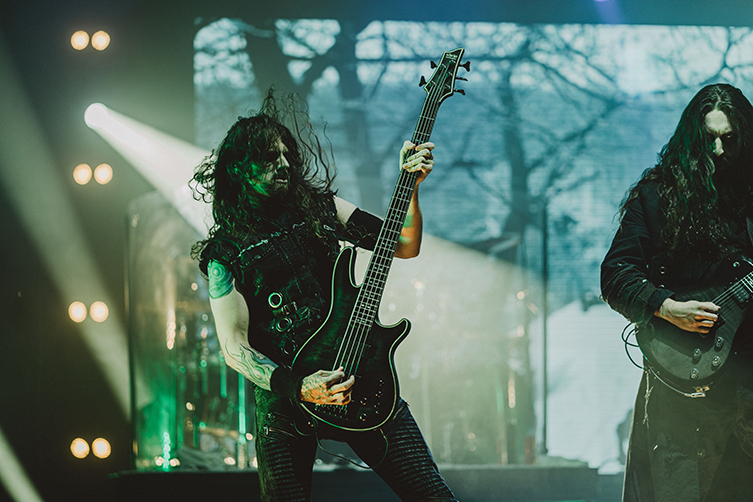
(Photo: Tom Russell)
GG: Yeah, those are important elements for sure. Am I right in saying that before joining Cradle of Filth as a bassist, you were a guitar player?
DF: That’s right, yeah. I’d been playing for maybe ten years when I switched over. It wasn’t really my intention to become a professional bassist or anything, I just wanted to start playing bass on some home recordings. Then a friend asked if I wanted to join his band, a Misfits cover band, and then from there the opportunities kind of snowballed, really.
GG: Ah, you were in a Misfits cover band?
DF: I was, yeah! Glasgow-based, called Devilock.
GG: Nice, I’m a big Misfits fan, so that’s great news, haha!
"Still, when we play in America, we sometimes get a small congregation gathering outside, telling everyone to stay away from this devilish music"
DF: Oh cool! Dani’s a massive Misfits fan as well.
GG: Ah! Yes, I can just imagine, because both bands have such theatrical aesthetics. But where Cradle of Filth is kind of classically romantic and gothic, Misfits are sort of a 1950s monster thing, right? It diverges there.
DF: Yeah! Well, it gave us something to talk about after that first gig, and I think Cradle of Filth actually covered Death Comes Ripping as well.
GG: Nice! So, as a musician, what were your formative influences apart from the Misfits?
DF: Well the mind goes straight to Iron Maiden, they were a big influence when I first started playing guitar, but then, maybe even more so when I started playing bass. Steve Harris is just incredible. He’s also mixed quite high in the albums, so it’s easy to pick out what he’s doing, and what he is doing is very interesting. Not just flashy, he serves the song, too. And he’s got amazing stage presence, it’s so good to watch him.
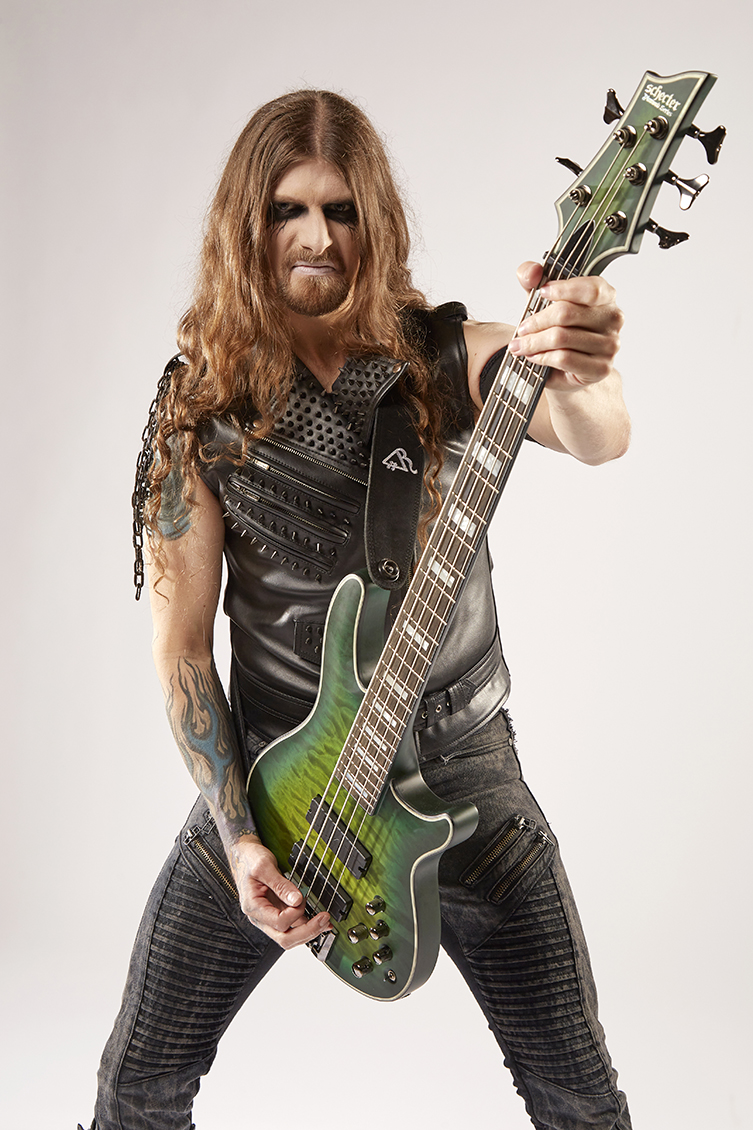
(Photo: James Sharrock)
Also, Rush are a huge influence. Again, Alex Lifeson and Geddy Lee are both incredible players, so those are the main ones, I’d say. Both bands had really good bassists at the forefront of their music, too.
GG: Yeah, that’s a really good point, actually. That really distinguishes both bands you just mentioned, particularly Iron Maiden because Steve Harris is the main songwriter, isn’t he?
DF: He is, yeah.
GG: Which is a good segue into...the songwriting process for Cradle of Filth! Now, you guys are all dotted around in various countries so it’s not like you’re all meeting up every week at the rehearsal room! When it’s time for a new record, how does that process begin? Do you all contribute?
DF: Generally, what we’ll do is have the sort of bare bones of a song, and we’ll send that to the rest of the band. Then people can give feedback and put their own ideas on it. Most recently it’s become even more of a collaborative sort of thing: for example, a section of a song might need a certain person’s touch on it, so we can say, ‘You have a crack at this and see what you can do with it’, and that’s seen some great results recently.
It would be cool if we could meet up in a rehearsal studio but for the last 3 albums, it’s been a case of sending emails back and forth, and some Dropbox and the like. In terms of being collaborative, it’s been more so than ever on the new album.
"I’m a big fan of horror films, and in terms of literature, I’m into Lovecraft and Poe, similar to the stuff that Dani likes"
GG: Brilliant! So, everybody has an equal voice and can, for want of a better term, submit ideas to the others? Then is it a matter of the best ideas survive?
DF: Yeah, definitely! It’s encouraged that we all put our ideas in the melting pot, and we try to be constructive with our feedback. Personally, I can take it a bit... a bit poorly when people criticise my stuff! I don’t take criticism very well. I need to realise that it’s not to be malicious: everyone just wants the album to be as good as it can be. We’re quite lucky that we have Scott Atkins as our producer. If you get really close to a song when you’re writing it, it can be difficult to judge it fairly. Scott can come and he’s straight with us: he’ll tell us what’s good and what’s bad; what needs to be done to make it better. So he’s very useful in that way. He’s like another member of the band these days.
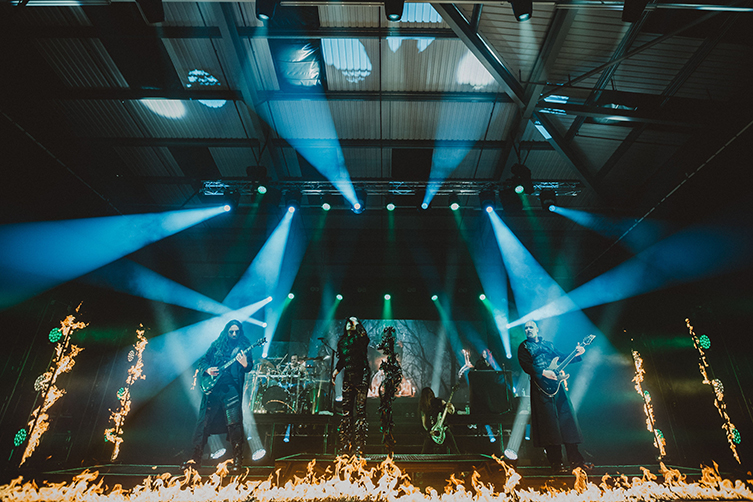
(Photo: Tom Russell)
GG: Excellent. And obviously without asking you to speak of Dani’s behalf, he’s the frontman of the band: does he have final say on these things?
DF: It’s pretty democratic, really. Yeah, I would say he would have the final say but it’s never really come to that. I mean, it’s not a case of butting heads so much, it’s more if somebody’s got an issue with a song, then there must be a good reason for it, so we’re receptive to everyone’s feedback. You’d be surprised at how democratic it is, really!
GG: Better than most bands in that regard then! Now, there have been quite a lot of members come and go in Cradle of Filth since its inception 30 years ago. Does that mean, without having to be too diplomatic or anything, that it’s quite an intense band to be in? Is that the reason the line-up has changed a fair bit?
DF: Well, it might’ve been in the past but since I joined the band, there’s not been quite so much of that, really. We got the two new guitarists a couple of years after I joined the band and since then, it’s been very stable. It was the same line-up for 7 years or so, and we only recently got a new keyboard player. It might have been the case that there was friction in the past: the troubles of touring, or maybe it was more money flying around and ‘party materials’, that sort of thing (laughs) which caused friction but it’s not really like that these days, I would say. It’s kind of like a family and we all get on with each other.
GG: Cool, glad to hear that! So, when Cradle of Filth go onstage, you’re not wearing your converse and your stonewash jeans: it’s a hugely theatrical situation with makeup, costumes, pyro and everything. Is the visual presentation as important as the songs, for Cradle of Filth?
DF: Um, personally, I would say it’s not as important. It is a big aspect of the band, and maybe some of the fans see it as being as important as the music, but I think the music comes first, to a large degree. You certainly don’t want to be using image as a crutch, anyway. But the fans do expect a certain level of theatricality, and we are quite happy to provide that! We love all that stuff as well – the pyro and the costumes – it just adds to the experience. But music is the main thing for me.
GG: Okay, cool. As it should be! Now, a lot of metal bands – we mentioned Iron Maiden there and to this I’d add Opeth as well – they create their own world for the music to inhabit and for fans to visit. Would you say that Cradle of Filth have their own world, too?
DF: Yeah, I’d say so, and that informs the writing as well because you kind of think about the history of the band and the legacy as you’re trying to write stuff. You don’t want to deviate too far from it, so it’s something that your constantly thinking about, really. I suppose a lot of that is down to Dani’s lyrics. He’s the sole lyricist, so it’s really up to him what pictures he wants to paint over the music. I don’t play such a big part in that, apart from trying to stay true to what’s already been established. We all have a good ear for what is ‘Cradle’ and what isn’t. Well, for the most part! Sometimes I do deviate too far into the power metal realm and I’ll be reined in by other members (laughs).
"We all have a good ear for what is ‘Cradle’ and what isn’t. Well, for the most part! Sometimes I do deviate too far into the power metal realm and I’ll be reined in by other members!"
GG: That’s an interesting point! You normally have a good sense of what is Cradle and whatisn’t, so, for the sake of discussion, what is Cradle, in terms of when you’re writing?
DF: It’s too difficult to say, that’s the thing. Generally, you just know. As I say, sometimes I get it wrong, and sometimes the other guys get it wrong, but between the 6 of us, we usually come to an agreement of what fits in to the band’s aesthetic and what doesn’t. Or the atmosphere.
GG: Yeah, yeah. It’s indefinable, but you know it intrinsically.
DF: It’s macabre, but it’s tragic, I would say, as well. It’s got to be tinged with sadness.
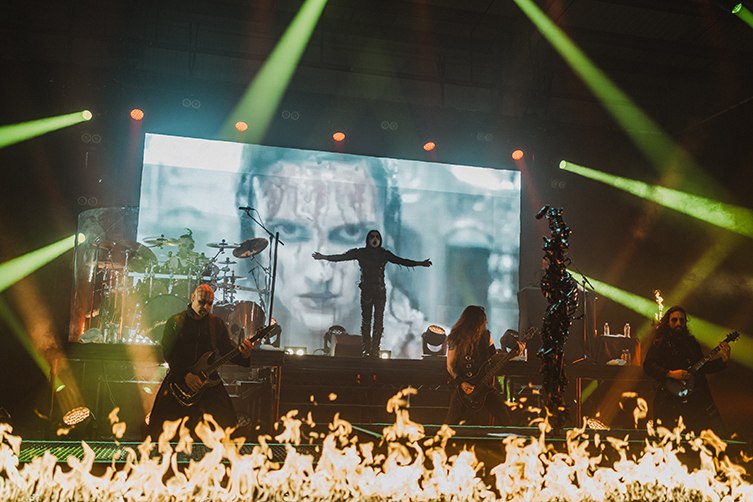
(Photo: Tom Russell)
GG: Good point, that’s an important element. Now, back in the day – and this would probably be previous to your experience with the band – there was quite a lot of controversy with certain T- shirt designs and so on (laughs), so I wonder: do you think today’s audiences a bit more used to experiencing extreme content? Are people today a bit less bothered by it all?
DF: I would say so. I certainly think there was a lot more backlash for doing that sort of thing in the olden days. We haven’t really seen much of that recently. Well, I haven’t! Still, when we play in America, we sometimes get a small congregation gathering outside, telling everyone to stay away from this devilish music, that sort of thing. I’ve experienced very little backlash personally, though. Attitudes have changed a bit.
GG: When you come across these people who stand outside and picket the shows, do you ever engage with them and try to sort of converse with them about it all?
DF: I generally don’t like drama enough to go and do that, really. But I think, a few tours ago, Lindsay and Rich (former keys player and current guitarist) have gone out. In fact, they didn’t mention they were part of Cradle at the time, they just sort of came along with some cups of coffee and tea for them and had a little chat with them. I suppose it was a bit surreptitious of them but then, when they are realized they were actually in the band, they were, like, throwing away the coffee and stuff! ‘Oh no, I’m drinking satanic coffee!’ (laughs) We’ll just be a wee bit classier than them in that kind of situation, really.
GG: Totally, it’s the best way to deal with it. So, let’s talk about basses! You have a new signature Schecter model! That’s exciting! How do you feel about having your own signature bass?
DF: It’s awesome! It’s something that, if you told me it was going to happen ten years ago, I would be like, ‘Naaaah’! But yeah, signature bass! I’m really happy to be doing it with Schecter because we’ve been working together for a long time now. I’ve always loved their instruments. So, it’s based on the Hellraiser Extreme, which is what I’ve been using since 2012, and I got a chance to make a few modifications to make it just to my liking.
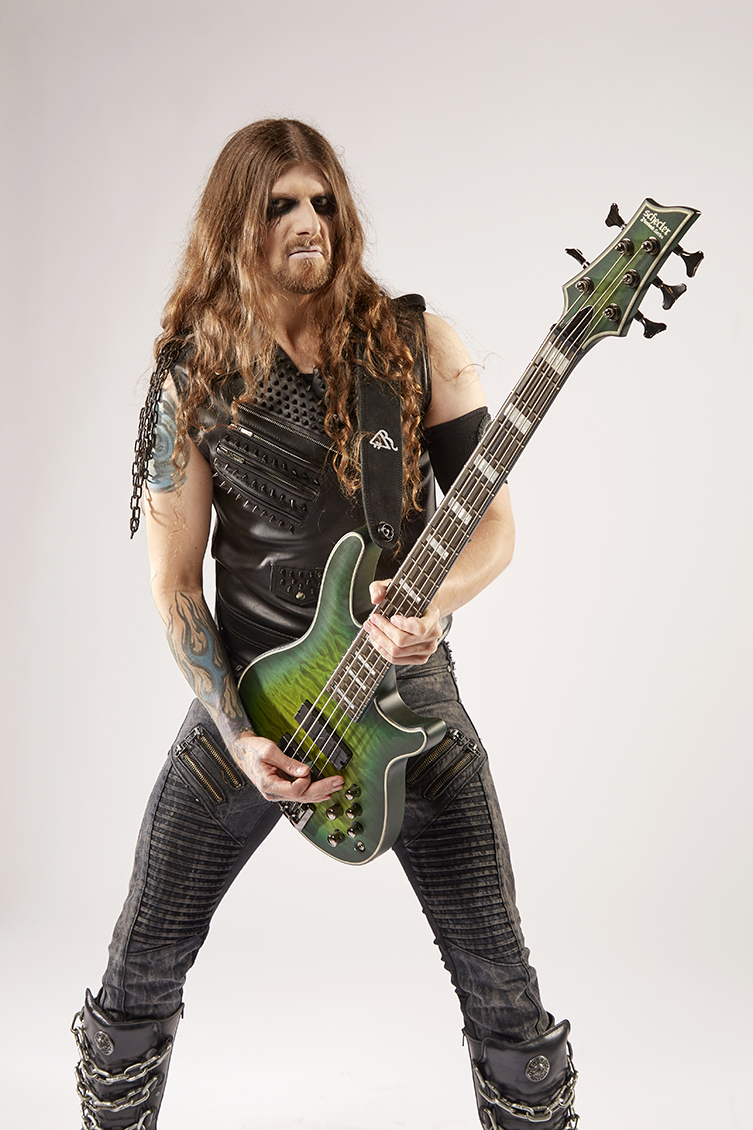
(Photo: James Sharrock)
GG: Yeah, so was that how the relationship developed: you just chose Schecter anyway and used them?
DF: Well, I suppose it was partly a matter of convenience in the beginning. Schecter have a distributor in Glasgow and our tour manager put me in touch with a guy who works there. I just went down there and tried a few basses. I loved them so I was quite happy to take one on the road. At that point, I got in touch with the guys from Schecter in America and we have just been working together since then. It’s been a good relationship.
GG: Fantastic! Now, your bass is beautiful! What kind of things do you look for in a bass, and what did you add to make it your own?
DF: Well, things I love about the production model, first of all: the look, it’s got a cracking shape; the playability, which on Schecter basses is incredible. Coming from guitar to bass, it didn’t feel like such a great jump, really. You’ve got jumbo frets and a nice low action, and the string spacing isn’t too crazy, so it feels really comfortable. There’s really good access on the neck as well. The sound was always great too, but that’s one thing we changed for my signature model. I tried these Fishman Fluence pickups a few years ago and they blew me away so I definitely wanted to get those in my signature bass.
GG: Cool, now these Fluence pickups: on the electric guitar models they have two different voicings, like Modern and Vintage or whatever. Is that the same for the bass models?
DF: It is, you actually get three different presets. You’ve got the classic sound, the modern sound and also the ‘funk’ sound as well, which is actually what I tend to use! (laughs) it fits my playing better than the modern sound. It’s got that bright top end which works really well for the type of sound that I really like.
GG: Yeah man! I love that: the bassist in Cradle of Filth uses the ‘funk’ setting on his bass, haha! That’s great!
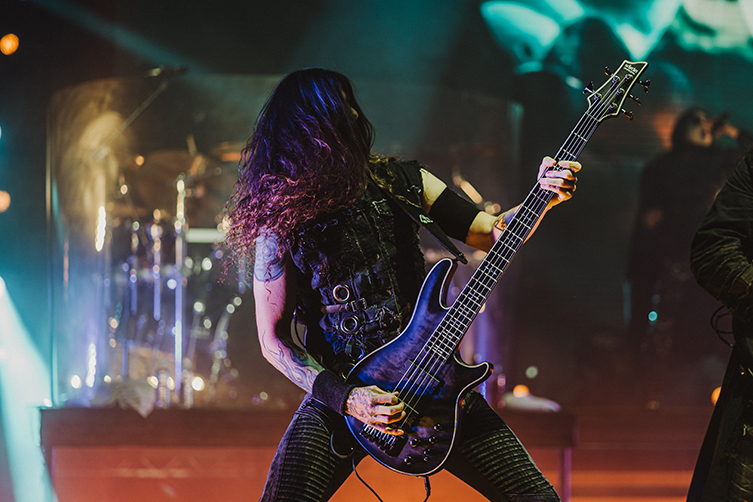
(Photo: Tom Russell)
DF: I do, yeah! (laughs) It just seems to give me the pick attack, and I like the noise of the strings slapping off the frets, you know? It might not be considered ‘best technique’, but I think it sounds good, just to play quite hard and get that aggressive sound on the top.
GG: It’s a very percussive way of playing.
DF: Yeah, exactly.
GG: Do you play more with a pick of do you also use your fingers?
DF: With Cradle, it’s always a pick. I’ve been doing a little bit of finger picking recently but it’s not something I spend a lot of time on, to be honest. As far as Cradle goes, and other bands I play in, it’s always with a pick.
GG: What pick do you prefer?
DF: It’s a Dunlop one, 1.5mm Gator Grip.
GG: Cool, and your bass is a 5-string. Are you staying in B standard tuning for that? Do the band tune down?
DF: The band plays in D standard, so everything is down a step. I do the same on the bass: put everything down a step, so it’s a low A that I’ve got. Quite often we’ve got riffs that involve a lot of open strings so it’s quite handy to just be a step down. It also gives me a lot of range at the bottom as well, so I’ve got more options for underpinning everything.
GG: Of course! And, the horror fan than I am wants to ask the horror fan that you are: the colour of your bass, which is lovely, is rather excellently called ‘Cthulhu Burst’: was that your idea?
DF: That was my idea! I knew I wanted a green bass, and before, there was a Dragon Burst colour that Schecter did, which I got on a custom bass of mine. I loved it, but I thought, if we just cut the yellow from the centre of the Dragon Burst, and had more of a lime green going out to a darker green, that would look amazing. And, thinking of a way to tie it in with Cradle, and of course as a reference to Lovecraft as well as a direct reference to the song Cthulhu Dawn, I thought: green, Cthulhu, that works for me! Call if Cthulhu Burst!
(Edit: we then spend a minute or two geeking out on how to properly pronounce ‘Cthulhu’ before carrying on with our conversation)
GG: So, you prefer a neck-through bass, in terms of construction?
DF: Um, yeah, I’d say so. In fact, I very rarely use a bolt-on neck. For the first two shows I did with Cradle, I used a Fender Jazz bass, so that would’ve been a bolt-on neck, but then I went out and got the Schecter. Since then, that’s all I’ve been using really.
GG: Nice. And, keeping with the subject of equipment but moving away from the basses themselves, let’s talk about the rest! What are you plugging into? Do you use pedals? And are you going into an amp or something else?
DF: Well, I’ve been using Darkglass pretty consistently for a long time now. I tend to just use the B7K Ultra, and I DI it straight into the desk. That’s what I use for Cradle shows. It sounds amazing. There’s no need for any amp on stage or anything, because we’re using in-ears these days.
GG: So you can show up anywhere with one bass and your Darkglass, and you’re good.
DF: Yeah, that’s the glorious thing about it: I can fit my rig in my backpack, no problem! It’s not like I have to make any compromises on sound, either. It just sounds incredible. I have no complaints at all, I truly love the Darkglass stuff.
GG: Fantastic! And just to round things off, Daniel, you haven’t been gigging lately of course because nobody has, but do Cradle have plans ramping up for the near-future? Are things starting to happen again?
DF: Yeah, we do! Luckily during the past year we did get the chance to do a live stream, so that just came out a couple of months ago now. Coming up, we have a second live stream, and we have a couple of festivals in the diary as well: we’re doing Alcatraz in Belgium and Bloodstock in England. Other than that, we’re just trying to make as much happen as soon as possible, really.
GG: Excellent! So I imagine when the opportunity to tour again becomes available, you guys will be back on the road?
DF: Oh yeah, our manager is very much on it! I’m sure we’re gonna be one of the first bands out there when it’s possible again!
We don’t doubt it for a second! A band with this level of pedigree is always going to be an enticing live proposition for fans of extreme music, so we hope they get back out there soon! On the meantime, keep up with their goings on at the official Cradle of Filth website.
We’d like to thank Daniel for giving us his time and company. Thanks to you for reading and sharing this interview! For more like it, please head over to our guitarguitar interviews page, where you can find interviews with Slipknot, Behemoth, Opeth and many more!
Until next time
Ray McClelland

